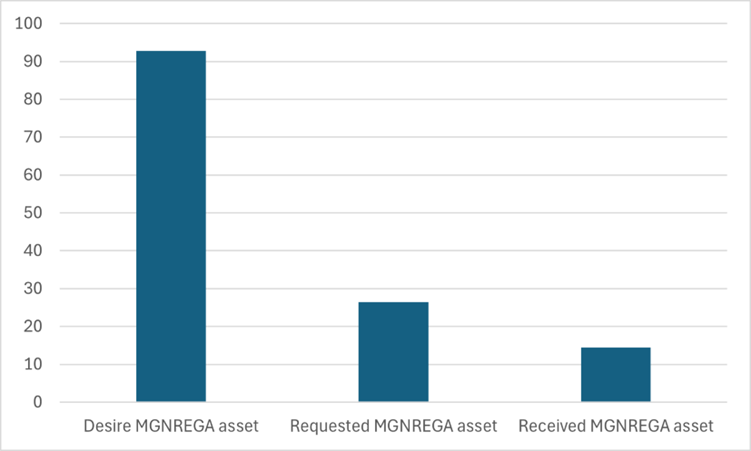Staking Claim to Entitlements under MGNREGA
-
From
CGIAR Initiative on Gender Equality
-
Published on
30.10.24

Discussions with an MGNREGA labour group in Araria, Bihar. Photo by Siddharth Kumar, SSEVS.
By Kalyani Raghunathan, Katrina Kosec, Jordan Kyle, Sudha Narayanan, and Soumyajit Ray
“What will I do by going there?”, answered Phoolan Devi from Bolangir district of Odisha, when asked if she attended the palli (revenue village) sabha. The answer seemed obvious – “Nothing.” After all, it was her husband who took all important decisions at home. But in Odisha, deliberations about assets to be constructed under India’s large national workfare programme, the Mahatma Gandhi National Rural Employment Guarantee Act (MGNREGA), typically take place in palli sabha meetings. It is here that women like Phoolan Devi can stake a claim to assets that would be useful to them or their families. Yet, most of them do not. What can drive women to exercise that right in ways that benefit themselves and their families?
Many public sector programmes—like MGNREGA—provide entitlements that can provide women with critical resources and improve their livelihoods. Yet, to “claim” these entitlements, citizens must take actions like filing paperwork, attending and speaking up in public meetings, participating in community planning processes, or approaching officials and community leaders. To take these actions, citizens need to both aspire to claim entitlements and be capable of doing so (Kruks-Wisner 2018). While claim-making aspirations reflect beliefs about self-efficacy (or ability to effect change) and about whether the state can and will respond to claims, claim-making capabilities reflect the knowledge and skills which individuals need to make a claim on the state. For example, beneficiaries need to know about the programme and how to complete the formal or informal processes required of them, have access to the relevant functionaries, be willing and able to advocate for themselves, and have the ability to navigate and participate in public spaces.
In many respects, women are at a disadvantage relative to men in claim-making. Women routinely face normative and structural barriers that are likely to limit both their aspirations and their capabilities for claim-making. For example, they often have less mobility, lower knowledge about public programmes, diminished access to assets and decision-making in their homes, lower literacy, and less-developed public speaking skills (Kosec et al., 2024).
If women are systematically less likely to engage in active claim-making, MGNREGA will be unable to benefit women to its full potential.
Within MGNREGA, which provides 100 days of work on demand at a stipulated minimum wage and aims to build durable assets through that work, the selection of assets is meant to be participatory. In theory, bottom-up, participatory planning should yield assets that are relevant and valued by the community, contributing to local well-being and livelihoods. Yet, whether MGNREGA can do so depends on who participates within the planning process. If women are systematically less likely to engage in active claim-making, MGNREGA will be unable to benefit women to its full potential.
To understand contextual factors around women’s claim-making within MGNREGA, we conducted a mixed methods study in Odisha including both a large-scale quantitative survey of 3,426 women across 230 gram panchayats (GPs) in five districts (Ganjam, Kalahandi, Mayurbhanj, Bolangir, and Rayagada) and an in-depth qualitative study including both men and women from six GPs in three districts. All women in our quantitative survey are MGNREGA job card holders and thus part of the key population that the programme intends to include within the participatory asset selection process. Ideally, women working on MGNREGA job sites should be contributing their ideas on what should be built that could most benefit them and their communities.
Our quantitative survey showed a significant gap between those who wish they had demanded an asset and those who have ever done so. While 92.8% of women desire an MGNREGA asset, only 26.4% have ever requested one, either individually or as part of a group (Figure 1). Even fewer have been successful in their claims. High demand for MGNREGA assets corresponds with other research which has found that an overwhelming 90% of those who have received assets through the programme find them useful (Ranaware et al. 2015).
Figure 1: Asset demands and successful claims

With such a significant gap between women’s aspirations and their active claim-making, understanding the contextual factors that explain why and when women are likely to make these active demands is critical for ensuring MGNREGA can better deliver benefits for women going forward. READ MORE
